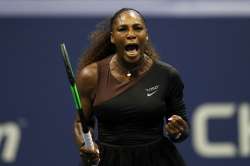US Open 2018: Serena Williams puts aside shaky start to beat Karolina Pliskova
Williams put aside some early shakiness and an early deficit, turning things around with an eight-game run en route to a 6-4, 6-3 victory over No. 8 seed Karolina Pliskova for a spot in the semifinals.

Serena Williams began her U.S. Open quarterfinal tentatively. Her shots lacked their usual sting, her attitude its usual conviction.
She was facing the last player she lost to at Flushing Meadows. She kept looking up her coach, as if seeking solutions. After just 20 minutes Tuesday night, Williams was in danger of trailing by two service breaks. Not much later, the outcome was no longer in doubt, because the 23-time Grand Slam champion suddenly was in complete control.
Williams put aside some early shakiness and an early deficit, turning things around with an eight-game run en route to a 6-4, 6-3 victory over No. 8 seed Karolina Pliskova for a spot in the semifinals. It was Williams' first win over a top-10 player this season.
"I was playing really not a good game," said Williams, who was a point from trailing 4-1 and did fall behind 4-2 while making 22 of her 30 unforced errors in the first set. "I was thinking, 'You know, I can play better.' So that was the good news."
Pliskova offered this guess about what was happening to Williams: "Maybe she was a little bit nervous."
Maybe. But that didn't last long.
Pliskova is a big server and hitter in her own right, someone who briefly spent time at No. 1 in the WTA rankings and was the runner-up at the U.S. Open in 2016 when she beat Williams in the semifinals. The 36-year-old American did not compete in New York a year ago, because she gave birth to her daughter during the tournament.
Go back to 2015, and that was another semifinal departure for Williams, whose bid for a calendar-year Grand Slam was shockingly ended by Roberta Vinci.
"Well, I want to just be able to get past the semis here. It's been a few, couple, rough semis for me," Williams said. "But regardless, this has been a great road."
This time, Williams' semifinal opponent will be No. 19 seed Anastasija Sevastova of Latvia, who surprisingly beat defending champion Sloane Stephens 6-2, 6-3 earlier Tuesday.
Stephens, who said she had been dealing with a sinus infection, rued all of her wasted opportunities, most notably the seven break points she failed to convert in the first set. She sure didn't attempt to hide her frustration, either, repeatedly gesturing toward or speaking in the direction of her coach, Kamau Murray, up in the stands.
When someone urged her to raise her level in the second set, Stephens replied, "I'm trying!"
"When you don't play big points well, the match can get away from you," Stephens said. "I think that's what happened today. I didn't convert."
Sevastova, who retired in 2013 because of injuries and returned nearly two years later, advanced to her first Slam semifinal.
"Still long way to go, I think," she said.
Especially considering that the next step will come against Williams, who's heading into her 36th semi at a major, 12th at Flushing Meadows.
Williams already proved at Wimbledon that she is capable of the sort of dominant performances she has shown over the years, making all the way to the final at the All England Club before losing. She'll hope to do one better now and claim a seventh U.S. Open title.
Her sluggish start against Pliskova came in the same 90-degree heat and 50-percent humidity that hampered John Isner in his quarterfinal loss to Juan Martin del Potro on Tuesday afternoon, and Roger Federer in his fourth-round exit against John Millman a night earlier and prompted the tournament to suspend play in junior matches for a few hours.
With her older sister, Venus — the woman she beat in the third round — in her guest box, Williams looked tight. Her timing was off. She put a backhand into the net to get broken to 2-1 at the outset. Then, down 3-1, she faced three break points; if Pliskova won any, she would have led 4-1. But Pliskova did not manage to put any of Williams' serves in play on those key points.
"Too strong," Pliskova said.
Soon after that, Williams went from trailing 4-2 to not only taking the first set but also leading 4-0 in the second.
By the end, Williams compiled a 13-3 edge in aces and 35-12 in total winners.
"She's playing with the same power. She can still serve well. I don't think there's any change with her game," Pliskova said. "She's just going for her shots."